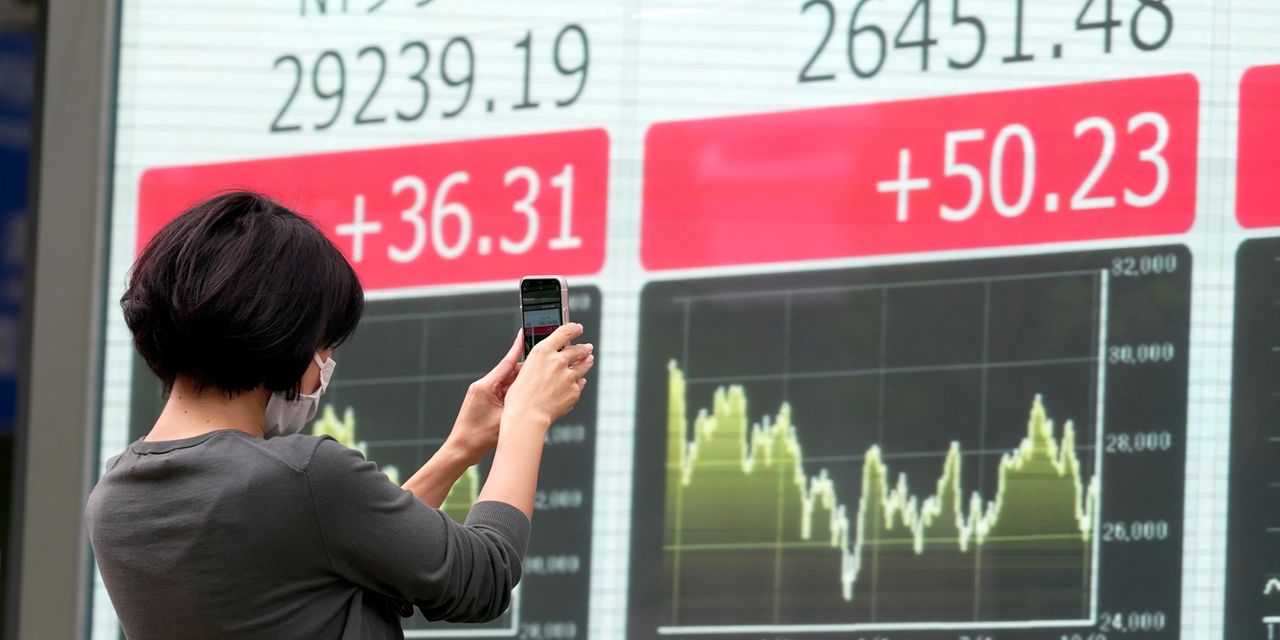TOKYO (AP) — Asian shares were mostly lower on Wednesday following another volatile day on Wall Street, as traders braced for updates on inflation and corporate earnings.
Benchmarks fell in Tokyo
NIY00,
Shanghai
SHCOMP,
and Hong Kong
HSI00,
but rose in Sydney.
South Korea’s Kospi
180721,
lost 0.1% to 2,189.86 after the Bank of Korea raised its key rate by 0.5 percentage point, amid the backdrop of Fed rate hikes in the U.S. and growing inflation risks from the weak won and rebounding global oil prices.
In currency trading the Japanese yen declined to a 24-year low against the U.S. dollar
JPYUSD,
at 146 yen-levels, raising expectations of another intervention by Tokyo to prop up the yen. By midday the dollar
USDJPY,
was at 146.17 yen, up from 145.80 late Tuesday. The euro
EURUSD,
cost 96.96 cents, inching down from 97.07 yen.
The weaker yen raises costs for both consumers and businesses who rely on imports of food, fuel and other needs, but the bigger purchasing power for foreign currencies is expected to boost tourism. Japan reopened fully to individual tourist travel this week after being closed for more than two years because of the pandemic.
Japan’s benchmark Nikkei 225 lost 0.2% to 26,348.73 in morning trading. Australia’s S&P/ASX 200
ASX10000,
gained nearly 0.2% to 6,656.00. Hong Kong’s Hang Seng slipped 2% to 16,491.39, while the Shanghai Composite shed 1.2% to 2,943.24.
On Tuesday, the S&P 500
SPX,
fell 0.7%, marking its fifth straight loss, closing at 3,588.84. The Nasdaq
COMP,
dropped 1.1% to 10,426.19. The Dow Jones Industrial Average
DJIA,
added 0.1% to 29,239.19, while the Russell 2000 index
RUT,
rose 1 point, or about 0.1%, to 1,692.92.
Recession fears have been weighing heavily on markets as stubbornly hot inflation burns businesses and consumers. Economic growth has been slowing as consumers temper spending and the Federal Reserve and other central banks raise interest rates.
The International Monetary Fund on Tuesday cut its forecast for global economic growth in 2023 to 2.7%, down from the 2.9% it had estimated in July. The cut comes as Europe faces a particularly high risk of a recession with energy costs soaring amid Russia’s invasion of Ukraine.
Wall Street is closely watching the Federal Reserve as it continues to aggressively raise its benchmark interest rate to make borrowing more expensive and slow economic growth. The goal is to cool inflation, but the strategy carries the risk of slowing the economy too much and pushing it into a recession.
“The market desperately wants a reason for the Fed to be able to stop tightening and the data recently hasn’t given them that opening with respect to inflation,” said Willie Delwiche, investment strategist at All Star Charts.
Computer-chip manufacturers continued slipping in the wake of the U.S. government’s decision to tighten export controls on semiconductors and chip manufacturing equipment to China. Qualcomm
QCOM,
fell 4%.
Uber
UBER,
fell 10.4% and Lyft
LYFT,
slumped 12% following a proposal by the U.S. government that could give contract workers at ride-hailing and other gig economy companies full status as employees.
The Fed will release minutes from its last meeting on Wednesday, possibly giving Wall Street more insight into its views on inflation and next steps.
Investors still expect the Fed to raise its overnight rate by three-quarters of a percentage point next month, the fourth such increase. That’s triple the usual amount, and would bring the rate up to a range of 3.75% to 4%. It started the year at virtually zero.
Rex Nutting: Leading indicators show inflation is slowing, but Fed policy makers are too busy looking in rearview mirror to notice
The government will also release its report on wholesale prices Wednesday, providing an update on how inflation is hitting businesses. The closely watched report on consumer prices will be released on Thursday, and a report on retail sales is due Friday.
“Everyone is still hoping that every inflation report will be the one that shows that pressure is alleviating,” Delwiche said.
Wall Street is also gearing up for the start of the latest corporate earnings reporting season, which could provide a clearer picture of inflation’s impact.
Among the companies reporting quarterly results this week: PepsiCo
PEP,
Delta Air Lines
DAL,
and Domino’s Pizza
DPZ,
Banks including Citigroup
C,
and JPMorgan Chase
JPM,
will also report results.
In energy trading, benchmark U.S. crude
CL00,
lost 82 cents to $88.53 a barrel in electronic trading on the New York Mercantile Exchange. U.S. crude-oil prices fell 2% Tuesday. Brent crude
BRN00,
the international pricing standard, fell 62 cents to $93.67 a barrel.
